QUIZZES & IMAGINARY NUMBERS
QUIZZES AND IMAGINARY NUMBERS
If you couldn’t tell from the title of today’s journal entry, my thoughts will be about how much I enjoy imaginary/complex numbers in algebra, and quizzes in general. No, this is not a joke. You can tell because I didn’t use the sarcasm font (why doesn’t that exist yet?).
Math Updates
Math is moving along well. I was a little worried that algebra II would be considerably more difficult than algebra and that my fondness for algebra would diminish, but fortunately that isn’t the case.
I’ve taken all of this before, but I forgot nearly everything I had learned. It’s true what they say about math and foreign languages: if you don’t use it, you lose it.
I am over a quarter of the way through algebra II on Khan Academy. That may not be accurate, as it’s difficult to judge the length of each of the lessons or how long the lectures will be. But I have completed more than a fourth of the topics for the class, so it’s a decent rough estimate.
Imaginary Numbers
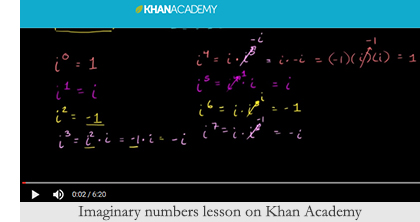
I love imaginary and complex numbers! They’re so much fun to work with.
I actually dreaded reaching the lesson on imaginary numbers because I couldn’t recall how to work with them. That was the case until I finished the first lesson. After that, I looked forward to using them as much as possible.
For those who aren’t familiar with the imaginary number, it’s defined as: i2 = -1 or i = √ -1
It’s special because no real number (i.e.: 5, ⅞, e, √ 2 , π, 0.13482, -18, etc.) can equal a negative number when it’s squared (multiplied by itself).
For example, -22 (or -2 x -2) = 4. The negative cancels itself out when it’s multiplied by another negative.
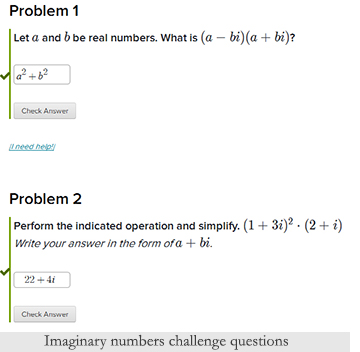
The only way you can get a negative number when squaring something is with imaginary numbers. It has a lot of really cool properties when you change the exponent, but I won’t get into all of that here.
As I was learning the simple properties of i, I started getting really excited about multiplying complex numbers and polynomials involving imaginary numbers.
I legitimately started smiling while thinking about it. Apparently, I am insane.
I was not disappointed when we got to that part of the lesson and I was way more excited than I should have been. That, so far, has been my all-time favorite part of mathematics since I began relearning it.
I’m not really sure why. It’s just different and has unique properties that I find interesting.
Are imaginary numbers even used in the real world? Absolutely!
They’re used in quantum mechanics, electrical engineering, signal processing (radar, telecommunications, or analyzing firing events of neurons in the brain), optics, chemistry, statistics, and economic theory.
I tend to doubt I will ever use them again in my future career, but I’m thoroughly enjoying them for the time being.
Analytics Updates
I went a little backward on The Analytics Edge on edX. If you recall, last week I had completed the lectures for week 3, but I had yet to work on all of the quizzes for the week.
I was having a little trouble figuring out the proper codes and arguments to use in R to answer some of the questions on the first quiz of week 3, so I decided to read through all of my notes thus far and redo all of the week 2 quizzes before attempting the following week.
That said, I have completed those and I finished the week 4 lectures today.
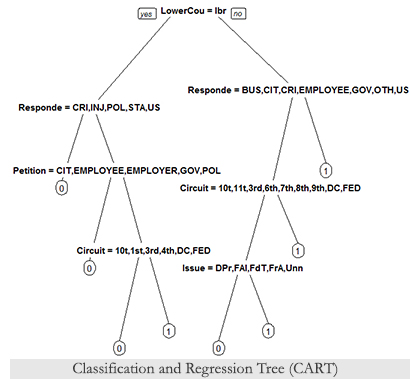
This week, we learned how to construct Classification and Regression Trees (CART) in R. The majority of the class centers around statistics, which makes sense. The main part of analytics is predicting outcomes, which requires statistical analyses.
CART looks at data, then predicts the outcome based on certain criteria. It answers yes or no on the first choice, then moves onto the second, and so on, forming a “tree.” That makes no sense the way I described it.
An example of a simple CART tree (that’s like saying ATM machine, automatic teller machine machine. . . it’s repetitive, but it sounds better to me) is displayed above. I made this during one of my lessons to see if it is possible to predict supreme court cases based on certain factors.
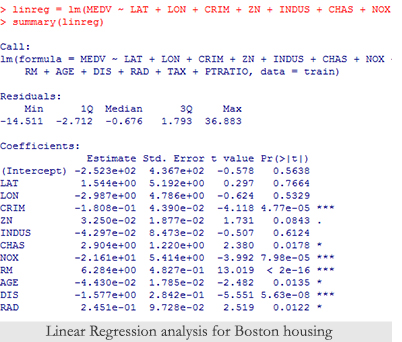
The original model created a tree for each supreme court justice to see how they would vote on certain issues. This was one of the justices. For this one, it begins by asking if the lower court decision was liberal. If yes, then you follow the tree to the left, or vice versa. Then it looks at who the respondent in the case is. If it’s one of those listed, then you go left again. At the bottom, 0 means the justice affirmed the decision of the lower court, 1 means he/she reversed it.
The model predicted which way that justice would vote with 72% accuracy.
Cool stuff!
We also used CART models to calculate the medical claims risks for patients and to predict housing costs in Boston based on location and pollution levels. Although, a regular linear regression model did better on the housing costs than CART. You have to use the best model for the data you're analyzing.
Quizzes
I know it seems strange to say that I love quizzes, but it’s true.
Throughout my schooling, I pretty much despised studying for and taking quizzes and tests, though less so in my later college years when I became a total nerd who loved school and took as many classes as possible.
My reasons now are that they are a great indication for how well I’m understanding the material, especially with online classes.
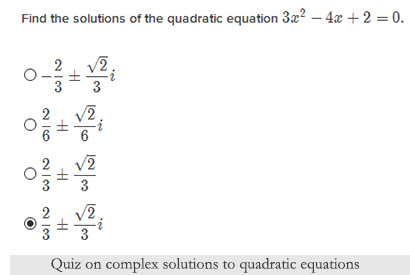
It’s easy to get through video lectures and feel confident that you are comfortable with all of the course materials. If you’re never given a quiz to test your knowledge, you may think you know everything.
Quizzes ensure that you are able to answer the problems on your own, and it helps to ingrain the knowledge into your brain. This is true for my math and analytics classes, along with most other topics.
Khan Academy has quizzes interspersed throughout all the lecture videos. Sometimes when I make foolish mistakes and have to solve more problems to get through the quiz, I get upset, but for the most part I’m thankful that they’re there.
As far as my data science studies go, this was one of the biggest differences between Coursera and edX.
As I mentioned in a previous journal, besides the fact that I didn’t like the way the class was taught, I hated the fact that my Coursera class would not allow me to take any of the quizzes without paying for the class.
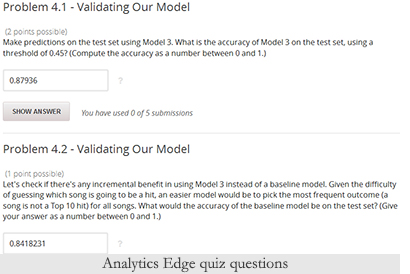
There was no way I could test any of my knowledge when I was being blocked from such an important part of learning.
My course on edX, on the other hand, offers all of the [extremely extensive] quizzes free to anyone taking the class. You still have to pay in order to receive a certificate of completion, which is completely understandable and something I would like to do.
With my limited exposure thus far, I’m not sure if all edX and Coursera classes are set up the same way regarding quizzes, but with this one class, I am completely sold on edX and I have already begun looking for new courses on their site to begin when I’m finished with this one.
But I feel for MOOC (Massive Open Online Courses), the quizzes should be available for all students. Not everyone can afford to pay for all of their classes and that shouldn’t be a hindrance to people who are interested in learning and bettering themselves.
I was fortunate enough to have been able to go to college and obtain a bachelor’s degree (even though I decided to change my career goals, hence the purpose of this journal). However, there are millions of people around the world who don’t have that opportunity.
This is why I love MOOCs so much. They provide the opportunities that so many people never had to improve their lives.
Conclusion
Thank you for reading. I sincerely hope you are all doing well and reaching for your dreams.
I’ll see you next week!

Author and hobby digital artist. Barry aspires to become a data scientist and better himself as a person.